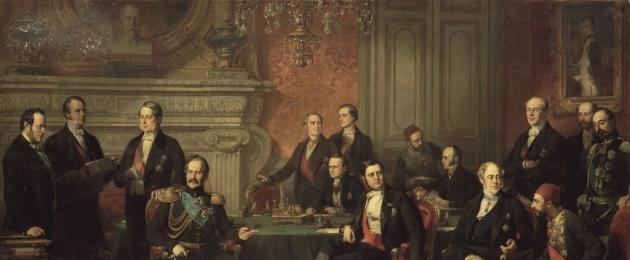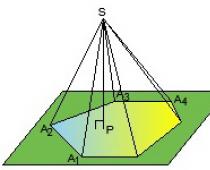On March 30, 1856, at a congress in Paris, a peace treaty was signed between coalition on the one hand, which included many allied countries, and Russian Empire. The hostilities, which lasted about two and a half years, could not lead to the desired result for any of the conflicting parties.
In the event of continued hostilities in which no one was interested, the coalition suffered heavy losses, fighting, in fact, away from their territories. The constant landing of troops was too costly - and an energy-consuming enterprise. The Russian Empire did not want to lose its grip on European and Black Sea borders, and in the event of a continuation of the war, there was a possibility of losing influence in these territories.
Brief description of the Crimean War
The reason for the conflict is the desire of the Russian Emperor Nicholas I to separate from the weakened Ottoman Empire Balkan territories, supporting the struggle of the Orthodox Slavs with the influence of the Muslim empire. The conflict began to develop Great Britain, in whose interests it was to oust Russia from Europe and knock it down from its dominant position in the Russo-Turkish war. The British were supported by France, in the person of Napoleon III, who wanted to strengthen his power by "revenge" for 1815. (Russian capture of Paris). Several more countries joined the union and supported military clash. And also the participants on the side of the coalition under the influence of Turkey were: the North Caucasian Imamat, the Circassians and the Principality of Abkhazia. Neutrality was occupied by the Kingdom of Prussia, the Swedish-Norwegian Union and the Austrian Empire. The indecision of the Russian military leaders made it possible for the coalition troops to land on the territory of the Crimea, from where the allied army began its advance to the East. The outcome of the war was the Treaty of Paris.
Participating countries
Representatives of the following countries arrived at the Paris Congress from the side of the coalition: Great Britain, France, the Ottoman Empire, Austria, Prussia and the Kingdom of Sardinia. The second side was represented by the Russian Empire without the support and any allies.
Representatives
Each side put forward two diplomats. At the meetings of the Congress, the French Minister of Foreign Affairs Alexander Walevsky was the chairman.
1st representative | 2-representative |
|
|---|---|---|
the Russian Empire | Alexey Orlov | Phillip Brunnow |
Ottoman Empire | Aali Pasha | Jamil Bay |
Great Britain | George Villiers Clarendon | Henry Wellesley |
Alexander Valevsky | François Adolphe de Bourkenet |
|
Kingdom of Sardinia | Benso di Cavour | S. di Villamarina |
Carl Buol | Johann Hübner |
|
Otto Theodor Manteuffel | M. Garzfeldt |

Main articles of the treaty
In Article III of the Paris Tract Russian emperor pledged to return to Turkey city of Kars and other Ottoman possessions occupied by Russian troops.
In Article XI, it was announced that from now on the Black Sea is neutral, which implies a ban on the navigation of military ships on these waters (i.e., this article deprive Russia of the navy).
In XIII it is forbidden to keep in coastal zones military docks and arsenals, for the rapid deployment of the naval flotilla.
Article XXI says that the lands given by Russia go to the Moldavian principality under the rule of Turkey.
Article XXII states that the Moldavian and Wallachian principalities remain under Turkish rule.
In Article XXVIII, the Principality of Serbia also remains under Turkish rule.
Also into the politics of the principalities and their independence Turkey has no right to interfere, according to agreements with European countries.
Outcome of negotiations
The result was humiliating for Russia, since it was deprived of one of its most significant advantages - the most powerful fleet on the Black Sea. The surrender of the conquered territories from the Russian Empire by the coalition was not such distressing news as the deprivation of one of the trump cards in the war with the Ottoman Empire.
Articles challenged by Russia
At the time of the signing of the Paris Peace Treaty, none of the articles could be challenged. But in 1871 on London Convention it turned out to cancel some of the articles by drawing up a new treaty.
Thanks to the new treaty, both Russia and Turkey had the right to have any number of military fleets in the Black Sea. It was a real diplomatic victory for Russia.
Document lifespan
The Paris Peace Treaty lasted in the form in which it was signed for 15 years. During this time, the Minister of Foreign Affairs of Russia A. M. Gorchakov, was able to revise the articles of the document and find convincing arguments for the creation of a new treatise.
Reflection in history
The Paris Peace Treaty turned the situation in Europe upside down. Russia was placed in a rigid framework, which curtailed its capabilities in the war with the Ottoman Empire, even if it was weakened. A system built on the conditions of the Russian Empire since 1815. (Vienna Treaty), completely collapsed. Karl Marx, as a contemporary of what is happening, wrote the following: The supremacy in Europe passed from St. Petersburg to Paris».
Bibliography:
- State edition of political literature - "Collection of treaties between Russia and other states 1856-1917" - edition of Moscow - 1952, 450 p.
). Signed in Paris on 18 (30) March at the closing session of the Congress of Powers by representatives of Russia (A. F. Orlov, F. I. Brunnov), France (A. Valevsky, F. Bourkenet), Great Britain (G. Clarendon, G. Cowley) , Turkey (Ali Pasha, Cemil Bay), Austria (K. Buol, I. Gübner), Prussia (O. Manteuffel, M. Garzfeldt), Sardinia (K. Cavour, S. Villamarina). The tsarist government, having suffered a defeat in the war, in the conditions of a maturing revolutionary situation, needed peace. Using the contradictions between the victors and their difficulties in connection with heavy losses near Sevastopol, Russian diplomacy achieved a softening of the peace conditions. Russia returned Kare to Turkey (in exchange for Sevastopol and other cities occupied by the allies); The Black Sea was declared neutral with the prohibition of Russia and Turkey to have a navy and arsenals there; freedom of navigation on the Danube was proclaimed under the control of international commissions; Russia handed over to Moldavia the mouth of the Danube and part of Southern Bessarabia; the powers, undertaking not to interfere in the affairs of Turkey, guaranteed the autonomy of Serbia, Moldavia and Wallachia within the framework of the Ottoman Empire (which excluded the claims of tsarism for special “protection” in relation to the Danube principalities and Orthodox subjects of Turkey). 3 conventions were attached to the agreement (the 1st confirmed the London Convention of 1841 on the closure of the Black Sea Straits for military vessels, the 2nd established the number of light military vessels of Russia and Turkey on the Black Sea for patrol service, and the 3rd obliged Russia not to build military fortifications on the Aland islands in the Baltic Sea). The P.M.D. weakened the positions of tsarism in Europe and the Middle East and led to a further aggravation of the Eastern Question. In 1859-62 Moldavia and Wallachia, with the support of Russia and France, united to form the Romanian state. This was a deviation from the conditions of the P. M. D., which, however, did not arouse objections from the Western powers. In 1870-71, Russia refused to recognize the articles of the P. M. D., which forbade it to have a navy and arsenals on the Black Sea, and the Western powers were forced to recognize the new state of affairs (see Gorchakov's circulars, Straits Conventions of London). Russia's victory in the Russo-Turkish War of 1877–78 caused the P. M. D. to be replaced by a treatise adopted at the Berlin Congress of 1878 (See Berlin Congress of 1878).
Lit.: Collection of agreements between Russia and other states. 1856-1917, M., 1952; History of Diplomacy, 2nd ed., vol. 1, M., 1959.
I. V. Bestuzhev-Lada.
Great Soviet Encyclopedia. - M.: Soviet Encyclopedia. 1969-1978 .
See what the "Paris Peace Treaty of 1856" is in other dictionaries:
This term has other meanings, see Paris Peace. Treaty of Paris (... Wikipedia
The agreement that ended Crimean War 1853 56. Having signed in Paris on March 18 (30) to conclude. meeting of the Congress of Powers by representatives of Russia (A.F. Orlov and F.I. Brunnov), Austria (K. Buol, I. Gübner), France (A. Valevsky, F. Burkene), ... ... Soviet historical encyclopedia
Treaty of Paris, Treaty of Paris: Treaty of Paris (1259) between the English and French kings on the first renunciation of claims to Normandy, Maine and other French territories lost by England under John Landless, but ... ... Wikipedia
The Paris peace treaty (tract) was signed on March 18 (30), 1856. Its discussion took place at the congress that opened on February 13 (25), 1856 in the capital of France. The congress was attended by Russia, France, England, Austria, Turkey and Sardinia ... Wikipedia
The preliminary agreement that completed the Russian Turkish war 1877 78. Signed on February 19 (March 3) in San Stefano (San Stefano, now Yesilkoy, near Istanbul) from the Russian side by Count N. P. Ignatiev and A. I. Nelidov, with the Turkish Safvet ... ... Great Soviet Encyclopedia
Treaty of Paris, Treaty of Paris, Treaty of Paris: Treaty of Paris (1229) between Count Raymond VII of Toulouse and King Louis IX of France, who graduated from the Albigensian crusade. Treaty of Paris (1259) between ... ... Wikipedia
Treaty of Paris (1259) between the English and French kings on the former's renunciation of claims to Normandy, Maine and other French territories lost by England under John Landless, but the preservation of Guyenne. The agreement was one of the reasons ... ... Wikipedia
The Paris peace treaty (tract) was signed on March 18 (30), 1856. Its discussion took place at the congress that opened on February 13 (25), 1856 in the capital of France. The congress was attended by Russia, France, England, Austria, Turkey and Sardinia ... Wikipedia
The Paris peace treaty (tract) was signed on March 18 (30), 1856. Its discussion took place at the congress that opened on February 13 (25), 1856 in the capital of France. The congress was attended by Russia, France, England, Austria, Turkey and Sardinia ... Wikipedia
This story is old, it is already more than a century and a half, but geographical names and countries, the mention of which is inevitable in the presentation of its plot, evoke certain associations with modernity. Crimea, Turkey, Russia, France, Britain - these are the scenery for the dramatic events that developed in mid-nineteenth century. All wars end in peace, even the longest and bloodiest. Another question is to what extent its conditions are beneficial to some countries and humiliating to others. The Peace of Paris was the result of the Crimean War, which was waged against Russia by the combined troops of France, Great Britain and Turkey.
Pre-war situation
In the middle of the century Europe experienced a serious crisis. inside Austria and Prussia could lead to the disintegration of these states, the displacement of borders and the collapse ruling dynasties. The Russian tsar sent an army to help the Austrian emperor, which stabilized the situation. It seemed that peace would come for a long time, but it turned out differently.
Revolutionary movements arose in Wallachia and Moldavia. After the entry of Russian and Turkish troops into these areas, a number of controversial issues arose regarding the boundaries of the protectorates, the rights of religious communities and Holy places, which ultimately meant a conflict regarding the spheres of influence of the powers adjacent to the Black Sea basin. In addition to the main countries directly interested, other states were drawn into it, not wanting to lose their geopolitical benefits - France, Britain and Prussia (which quickly forgot about gratitude for the miraculous salvation of their monarch). The Russian delegation headed by Prince. Menshikov did not show the necessary degree of diplomacy, put forward ultimatum demands and, without achieving a result, left Constantinople. In early June, forty thousandth Russian corps invaded the Danubian principalities. In autumn, the fleets of France and Britain led their warships through the Dardanelles, providing military assistance to Turkey. On November 30, a squadron under the command of Ushakov launched a preemptive strike against the Turkish naval forces in Sinop, and the Western powers intervened directly in the conflict, which came as a surprise to Nicholas I. Contrary to expectations, it turned out to be well prepared. In 1854 the Crimean War began.

War
It seemed risky to the Western powers to wage a land war with Russia (the Napoleonic campaign was still fresh in their memory), and the strategic plan was to strike at the most vulnerable place - in the Crimea, using the advantage of the naval forces. The poorly developed link between the peninsula and the central provinces played into the hands of the Anglo-French-Turkish coalition, which made it difficult to supply troops and supply reinforcements. Yevpatoria became the landing site, then there was a serious clash on it. It turned out that the Russian troops were not sufficiently prepared for war both in terms of weapons and in terms of training. They had to retreat to Sevastopol, the siege of which lasted a year. In the face of a lack of ammunition, food and other resources, the Russian command managed to establish the defense of the city, to build fortifications in a short time (initially there were almost none on land). Meanwhile, the forces of the Western Allies were suffering from disease and daring sorties by the defenders of Sevastopol. As the participants in the negotiations later noted, the signing of the Peace of Paris took place with the invisible participation of the city that died heroically during the defense.

Peace conditions
Ultimately, Russia suffered a military defeat. In 1855, during the defense of Sevastopol, Emperor Nicholas I died, and Alexander II inherited the throne. The new ruler understood that fighting, despite the brilliant successes in the Asian theater, are developing unfavorably for Russia. The death of Kornilov and Nakhimov actually beheaded the command, further holding the city became problematic. In 1856, Sevastopol was occupied by the troops of the Western coalition. The leaders of Britain, France and Turkey drew up a draft agreement consisting of four points, which was accepted by Alexander II. The treaty itself, called the Peace of Paris, was signed on March 30, 1856. It should be noted that the victorious countries, exhausted by a long military campaign, very costly and bloody, took care of the acceptability of his points for Russia. This was facilitated by the victorious actions of our army in the Asian theater, in particular, the successful assault on the fortress of Kare. The terms of the Peace of Paris primarily affected relations with Turkey, which undertook to ensure the rights of the Christian population on its territory, the neutrality of the Black Sea area, the retreat in its favor of two hundred square miles of territory and the inviolability of its borders.

Peaceful Black Sea
At first glance, the just demand for the demilitarization of the Black Sea coast in order to avoid further conflicts between countries actually contributed to the strengthening of Turkey's position in the region, since the Ottoman Empire reserved the right to have fleets in the Mediterranean and Marmara Seas. The peace of Paris also included an annex (convention) concerning the straits through which foreign warships were not to pass in peacetime.

End of the terms of the Peace of Paris
Any military defeat leads to limited opportunities for the defeated side. The Peace of Paris changed the balance of power in Europe for a long time, which had developed after the signing of the Vienna Treaty (1815), and not in favor of Russia. The war as a whole revealed many shortcomings and vices in the organization of army and navy construction, which prompted the Russian leadership to carry out a number of reforms. After another, this time victorious, Russian-Turkish war (1877-1878), all restrictions on sovereignty and territorial losses were leveled. Thus ended the Treaty of Paris. The year 1878 became the date of the signing of the Berlin Treaty, which restored Russia's regional dominance in the Black Sea.
Dear editors!
I was surprised that on the websites of Sevastopol on March 30 they mentioned anything, but not a single word was mentioned about the conclusion of the Paris Peace Treaty of 1856,
who played important role in the fate of our city and the Black Sea Fleet! From Wikipedia
Treaty of Paris (Paris Treaty) - an international treaty signed March 18 (30), 1856 at the Paris Congress, which opened on February 13 (25), 1856 in the capital of France. The congress was attended by Russia, on the one hand, and the allies in the Crimean War, the Ottoman Empire, France, England, Austria, Sardinia, and Prussia.
The unsuccessful course of the war for Russia led to the infringement of its rights and interests; territorial losses in the end turned out to be for her, however, minimal (initially, England demanded, among other things, the cession of Bessarabia and the destruction of Nikolaev): Russia refused to strengthen the Aland Islands; agreed to freedom of navigation on the Danube; renounced the protectorate over Wallachia, Moldavia and Serbia and part of southern Bessarabia; ceded to Moldavia its possessions in the mouths of the Danube and part of Southern Bessarabia, returned Kars occupied from Turkey (in exchange for Sevastopol and other Crimean cities).
Of fundamental importance for Russia was the point on the neutralization of the Black Sea. Neutralization meant a ban on all Black Sea powers to have navies, arsenals and fortresses on the Black Sea. Thus, the Russian Empire was placed in an unequal position with the Ottoman Empire, which retained its entire naval forces in the Marmara and Mediterranean Seas.
The treatise was accompanied by a convention on the Bosporus and Dardanelles straits, confirming their closure to foreign warships in peacetime.
The Paris Peace Treaty of 1856 completely changed the international situation in Europe, destroying the European system based on the Vienna Treaty of 1815. “The supremacy in Europe passed from St. Petersburg to Paris,” K. Marx wrote about this time. The Treaty of Paris became the core of European diplomacy until the Franco-Prussian War of 1870-1871.
The multilateral treaty was signed in Paris on 18 (30) March at the closing session of the Congress of Powers by representatives of Russia (A. F. Orlov, F. I. Brunnov), France (A. Valevsky, F. Bourkenet), Great Britain (G. Clarendon, G. Kauli), Turkey (Ali Pasha, Cemil Bay), Austria (K. Buol, I. Gübner), Prussia (O. Manteuffel, M. Harzfeldt), Sardinia (C. Cavour, S. Villamarina).
Interestingly, Count Alexei Fedorovich Orlov, who signed the treaty on behalf of Russia, is the brother of Mikhail Fedorovich Orlov, who played an important role in the capitulation of Paris in 1815 before allied forces that smashed the remnants Napoleonic army. In those years, Russia, Austria, England were allies ... Paris, the treasury of French culture, was then saved for France and the world, with the most active participation of Russian soldiers.
What happened in Sevastopol, captured by the Allied forces in August 1855, can hardly be considered a merit of Western civilization...
In 2011, France and the UK celebrated the 155th anniversary of the Peace of Paris. Russia refused to participate in the celebrations ...
For Sevastopol residents, these events have retained their importance at the present time, because this is part of our history!
Sincerely, Alexey Baskakov
Peace of Paris or Sevastopol in March
Drenched in winter quarters, buried in history
The shame of the inglorious world is all the exploits of the Crimean War.
Again, on the French boulevards, jokes are sharply over the Russians.
The drunken hussars are forgotten, only the word "bistro" remains.
Bending down to the table, sign, fastening the Treaty of Paris,
Russian adverb: "bl ... in" the diplomat uttered in his hearts ...
For a long memory of Europe, we left notches:
Parisian "Boulevard Sevastopol" and the street of the river Alma.
Sevastopol lies in ruins, Russian names are not heard here ...
The ruins are plundered without order by the descendants of native tribes.
Shadows appear to the dead - the invader disturbs their sleep
And the steps of the marble stairs to the foggy Albion.
And the bell that rang over the sea in a storm until dawn,
Stolen from the Russians, humiliated, and thrown into Notre-Dame de Paris.
There are no more cheerful gypsies - no one is happy with the winners.
Italian women are brought to Russia to amuse the British soldiers.
There is no city, fleet and glory, and there is no strength for revenge ...
For a long time remained bloody in Russian history track.
But why measure us by losses ... Just a little, you little fool, wait a minute.
Epoch Russian empires looms ahead again!
Russo-English Peace 1856
The Treaty of Paris completed Crimean War 1853-1856 (in 1853 - Russian-Turkish, since 1854 - Russia against Turkey, Great Britain, France and Sardinia).
A comment:
The Paris Peace Treaty of 1856 ended the Crimean War of 1853–56. Signed on March 18 (30) at the Paris Congress by representatives of Russia, on the one hand, England, France, Turkey, Sardinia, as well as Austria and Prussia participating in the negotiations, on the other. Russia returned Kare to Turkey in exchange for Sevastopol, Balaklava, and other Crimean cities captured by the allies. Black m. was declared neutral, Russia and Turkey were deprived of the right to have a military on the Black m. fleet and navy. arsenals. This was the most difficult condition for Russia, infringing on its state. sovereignty. Proclaimed freedom of navigation on the Danube under the control of international. commissions. Russia transferred to the Moldavian Principality the mouth of the Danube and part of the South. Bessarabia. All powers pledged not to interfere in the internal. Turkish affairs and jointly guaranteed the autonomy of the Danubian Principalities and Serbia, while maintaining the power of the Sultan over them. To finish, determine the position and rights of the Danubian principalities, it was decided to convene a special. conference (Paris Conference 1858), although Russian. the delegation insisted on the immediate unification of Moldavia and Wallachia, the maximum weakening of the tour. influence on them. The patronage of Christian subjects in Turkey, which was carried out by Russia before the war, was transferred to Europe. powers. Three conventions were attached to P. m. The 1st basically confirmed the London Convention of 1841 on the closure of the Bosphorus and Dardanelles for the military. courts of all countries except Turkey; The 2nd set the number of light troops. ships of Russia and Turkey on the Black Sea for patrol service (6 steam ships of 800 tons each and 4 ships of 200 tons each for both sides); The 3rd obliged Russia not to build military units on the Aland Islands in the Baltic Sea. fortifications. P. m. d. weakened the int. Russia's influence in Europe and in Eastern affairs, led to an even greater aggravation of the so-called. Eastern question, contributed to the further expansion of the West. powers on Bl. East and the transformation of Turkey into a semi-colony. Russia's victory in the Russo-Turkish War of 1877–78, which ended with the Treaty of San Stefano, caused the P. M. D. to be replaced by a new treatise adopted at the Berlin Congress of 1878.
P. M. Tarasov.
Used materials of the Great Soviet Encyclopedia in 8 volumes, v. 6
Publication:
Collection of agreements between Russia and other states. 1856-1917. M., 1952, p. 23-24.
- In contact with 0
- Google+ 0
- OK 0
- Facebook 0








